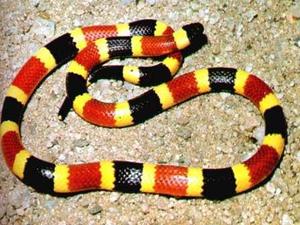Coral snake antivenin to run out in October
If you live in Florida, you should now be doubly careful not to be bitten by the poisonous coral snake; the only company making antivenin for coral snake bites is no longer producing the drug — and the last batch will hit its expiration date in October.

The Eastern Coral snake // Source: vox.com
If you live in Florida, make sure not to be bitten by a coral snake, a slender yellow, red, and black snake. The coral snake is particularly dangerous because its venom can take up to eighteen hours to start showing itself, and many people who get bitten thus do not seek help until it is very late in the game. Left untreated, the venom can kill by shutting down a victim’s lungs.
The good news is that there is antivenin for coral snake bites. Tampa Tribune’s Keith Morelli writes that the bad news is that the one manufacturer that made the stuff is no longer making it. Come October, the last batch of coral snake antivenin hits its expiration date.
The problem with manufacturing the antivenin is that so little is used through the course of a year it is not profitable for drug companies to invest millions into studies, tests and manufacturing. The Food and Drug Administration will test the existing antivenin batch in October and could grant permission to administer it for another year, giving researchers time to come up with an alternative, said Cynthia Lewis-Younger, medical director of the Florida Poison Information Center in Tampa.
The Florida Poison Information Center is creating an informational Web page on the subject and is expected to post it on its website by the end of this week, Lewis-Younger said.
“We believe it is likely that the existing [antivenin] lot will be extended for another year,” she said, “however, at some point, probably next year, we will have exhausted all that antivenin.”
Lewis-Younger said medical care providers are concerned about the antivenin issue but hopeful another antivenin will be developed to take its place.
She said researchers currently are working on three possible alternatives, including Coralmyn, which is most likely antivenin to take the place of the existing one. None of the alternatives has been approved by the FDA.
The problem lies in the cost to develop a vaccine that is not used that often, she said. The national average is about 100 coral snake bites a year, Lewis-Younger said. “The risk, if you don’t get treatment, is that you may die,” she said. “If you do go into a hospital and don’t get the antivenin, you may end up on ventilator for many weeks.”
Coral snake bite victims go through at least three 10-milliliter vials of antivenin. Each vial costs $1,560, she said.
